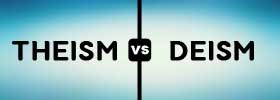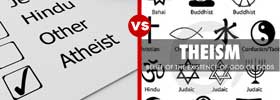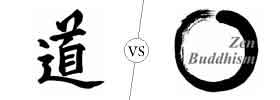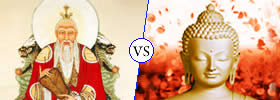Religion & Spirituality
|
Matter is anything that exists and has mass, i.e. anything that has a physical presence. In most contexts, the term ‘spirit’ refers to the soul, i.e. the thing that gives a body life. In most ideologies, the spirit is the soul, whereas the matter represents the body. |
|
Both Theism and Deism are schools of thought dealing primarily with the presence of God and his role in our lives. Theism is the belief that at least one god exists and that he or they created the universe and governs it. Deism is the belief that a higher being, i.e. god exists, but does not tell people what to do. |
|
In Christianity, the two terms generally mean the same thing. They both refer to people that have a leadership role to guide and advice people regarding their spirituality. In the Roman Catholic Church, the bishop is an office where they are responsible for looking after a group of churches and congregations. |
|
Atheism and Theism both deal with religion and the existence of God. The primary difference between Atheism and Theism is the fact that theism is the belief in the existence of God, whereas Atheism is the belief in the non-existence of God. |
|
La Tomatina is a Spanish festival that includes throwing ripe tomatoes at other participants in an attempt to drench them in tomato juice for good fun. Holi is an Indian festival that includes throwing colored powder and colored solution at other people in order to color them. |
|
Both Jesus and Muhammad are the figureheads of their corresponding religions. Jesus is the central figure of Christianity, while Muhammad is the central figure of Islam. |
|
Purgatory is the place where souls are prepared for Heaven. The Limbo of doctrine was introduced by philosopher Augustine, who claimed that children who are not baptized are consigned to hell. |
|
Both Jupiter and Zeus are powerful gods of the Roman and Greek mythologies respectively. They both are considered to be the same god in different time and cultures, though they have their slight difference in powers, weapons and appearances. |
|
Rebirth is associated with doctrine of Buddhism where it denies the notion of any soul. Rebirth is referred to as the repeated occurrence of the process of existence. On the other hand, reincarnation is associated with doctrine of Hinduism, where it is defines by the nature of soul, which is permanent and is supposed to reborn by just taking a new body. |
|
Karma is a concept central to Hinduism. It describes that the actions performed in the past effects the state in the present, and similarly the actions performed in the present will affect the future state. Destiny is related to future events which are considered to be inevitable and unalterable. The notion of karma considers the actions of a person in the past shapes the destiny of that person. |
|
GrihaPravesh and VastuShanti are related to a well know ceremony related to Hindu rituals. GrihaPravesh is performed for the purifying a space before started living in it. Vastu shanti is a puja which is performed as part of the GrihaPravesh Puja (prayer). It includes a homa which is performed in order to create a peaceful environment and keep away the negative forces. |
|
The key difference between the two terms is that Taoism is a religion and philosophy, whereas Zen is a method or path to attain Buddhism. Although, they both originated in China, and Taoism influenced the path of Zen, they completely differ in their technique and intent in achieving the path for their goals. |
|
Though there are many similarities between the two, the key difference between them is that Confucianism is an ethical and philosophical system, whereas Buddhism is a followed religion. |
|
Confucianism and Taoism are both ancient Chinese styles of living. The difference between these two philosophies is based on their teachings, wherein Taoism is all about the relationship between a man and nature, and Confucianism is more about the relationship between man and the society. |
|
Taoism and Buddhism are the two great philosophical and religious traditions that originated in Asia. Although, Taoism and Buddhism have similar goals, they completely differ in their beliefs, practices and perspectives about individual life, society, values, culture, the environment and even the universe. |
Pages
 |
 |
 |
 |
 |
 |
 |
 |















